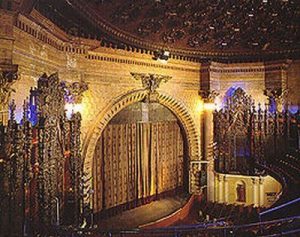Egypt is often popularly known as the “cultural capital of the Arab world” for its host of Egyptian Theatre, cinema halls, operas and a huge variety of modern cultural institutions.

Ancient Egyptian theatre emerged from ritual practices. The earliest example of ceremony and ritual evolving towards theatre comes from ancient Egypt. For example, a passion play performed annually at Abydos from about 2500 bc to about 550 bc dealt with the death and resurrection of the god Osiris.
Although no part of the text remains, references to it suggest it was one of the most elaborate spectacles ever staged and included mock battles, processions, and burial ceremonies.
“Pyramid texts” dating from 2800 to 2400 B.C., contain dramas sending the dead pharaoh off to the underworld. These dramas also depict the continuity of life and the pharaoh’s power. There is also the Memphite Drama, recounting the story of the death and resurrection of the god Osiris, and the coronation of his son Horus.
Important Egyptian Drama
The most important Egyptian drama, though, was the Abydos passion play. Like the Memphite drama, the Abydos passion play concerns the story of Osiris. The paramount Egyptian myth, this drama was enacted at the most sacred place in Egypt, Abydos- the burial site of Osiris.
Performed annually from 2500 to 550 B.C. and full of spectacle, this passion play was the first of its kind ever recorded and is the first example of theatre.
The Osirian mysteries were among the most important public displays in ancient Egypt. The murder of Osiris by Seth, his dismemberment, and resuscitation made for emotive Egyptian Theatre and was frequently shown, with the main roles possibly played by priestly actors who may have worn masks, representations of the gods they incorporated, and extras who were members of the public. Abydos and Busiris were important centers for these activities.
Local myths supplied storylines for many plays which often had satirical overtones: The pharaoh received five hundred lashes, his wives deceived him, he couldn’t make up his mind and became a slave to his advisors; and his architects robbed his wealth.
In Egypt, Greek theatre arrived as part of the general Hellenisation of Egypt following the conquest of the country by Alexander the Great (332 BC). One of the earliest Greek papyri from Egypt preserves part of a play called The Persians, by Timotheus of Miletus.
Excavations have revealed great theatres in the architecture of the Roman Period, at Alexandria, and Oxyrhynchus. The theatre portico at Antinoopolis is one of the magnificent Roman monuments of that city recorded by the French military expedition of 1798-1801 but was destroyed in an early 19th century due to growing industrialization.
Despite the advanced civilization that developed in ancient Egypt, the theatrical activity never progressed beyond ritual, pageantry, burial ceremonies, and commemorations of dead pharaohs.